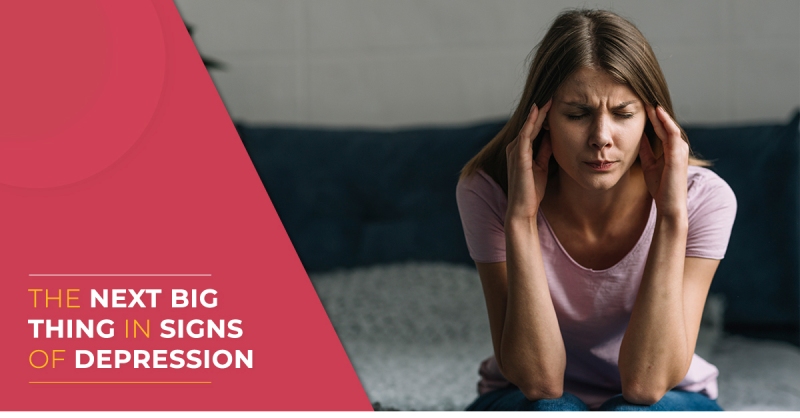Being unhappy is n’t the same as being depressed. Depression is a term often used loosely to express how we feel after a bad week at work or when we’re going through a breakup. However, major depressive disorder — a type of depression — is much more complicated. There are specific signs that determine whether it’s depression or sadness we all sometimes experience in life.
Depression can cause the affected person to suffer and function poorly at work, at school, and in the family. At its worst, depression can lead to suicide. Nearly 8,00,000 people die due to suicide each year. Suicide is the next leading cause of death in 15-29-year-olds.
Table of Contents
Types and symptoms
Based on the severity of symptoms, a depressive episode can be classified as mild, moderate, or severe.
A key distinction is also made between depression in people who have or do not have a story of manic episodes. Both types of depression can be chronic (i.e., over an extended period) with relapses, especially if they go untreated.
Recurrent depressive disorder:
This disorder involves repeated depressive episodes. The person feels the depressed mood, enjoyment, and loss of interest, low energy leading to diminished activity in these episodes.
Most of the people also suffer from anxiety signs, appetite, disturbed sleep, low self-worth or feeling of guilt and poor concentration, and other medically not predicted symptoms.
Bipolar affective disorder:
This type of depression consists of both depressive and manic episodes based on periods of normal mood. Manic episodes involve irritable or elevated mood, over-activity, pressure of speech, inflated self-esteem, and a decreased need for sleep.
Depressive episodes such as anxiety, hopeless of outlook, loss of interest, increased fatigue and disturbed sleep, Change in appetite and weight,Irritability in men
Anxiety
While depression hasn’t been shown to cause anxiety, these two conditions occur often. Signs of anxiety can include:
- Rapid breathing
- prolonged or heavy sweating
- Rapid heart rate
- Restlessness or feeling tense, nervousness
- Muscle twitching or trembling
Hopeless outlook
Major depression is a mood disorder that affects the way you feel about life on average. Having a hopeless or helpless outlook on your life is the most common sign of depression.
Other feelings may be worthlessness, inappropriate guilt or self-hate, Frequent, recurring thoughts of depression may be vocalized as, “It’s all my fault,” or “What’s the point?”
Loss of interest
Depression can take the pleasure or satisfaction out of the things you love. A loss of interest or withdrawal from actions that you once looked forward to — hobbies, sports, or going out with friends — is yet another telltale symptom of major depression.
Signs of major depression also include a decreased sex drive and even impotence.
Increased fatigue and disturbed sleep
Part of the reason you might stop doing things you enjoy is that you feel exhausted. Depression often comes with an overwhelming feeling of fatigue and a lack of energy which can be among the most debilitating symptoms of depression. This could lead to excessive sleeping. Depression is also connected with insomnia, as one might lead to the other and vice versa. They can also make each other worse. The lack of quality, restless sleep can also lead to anxiety.
Change in appetite and weight
Weight and appetite can fluctuate for people with depression. This experience may be different for each person. Some people will have an increased appetite and gain weight, while others won’t be hungry and will lose weight. One evidence of whether dietary changes are related to depression is if they’re intentional or not.
Irritability in men
Depression can affect the sexes differently. Research shows that men with depression may have signs such as irritability, escapist or risky behavior, substance abuse, or misplaced anger.
Diagnosis and treatment
If support from family and friends and positive lifestyle changes aren’t enough, it may be time to ask help from a mental health professional. There are many effective treatments for depression, including:
Therapy: Effective treatment for depression may also include consulting a therapist who can provide you the tools to treat depression from a variety of angles and motivate you to take the action required. Therapy may also offer you the skills and insight to prevent depression from coming back.
Medication: may be imperative if you’re feeling violent or suicidal. But while it can help relieve signs of depression in some people, it isn’t a cure and is not normally a long-term solution.
Bottom Line
Depression affects millions of people, however, there are varying treatments available, from lifestyle changes to medications. No matter the path of treatment you choose, seeking for professional help is the first step to getting back to feeling like yourself again.
Author Bio:
Kalaivani is a content writer in Pulse Pharmacy, Is a leading online medicine seller in India. Kalaivani is exclusive in guest blogging, blog publishing and social media campaigns. She believes in the fact that being healthy and fit isn’t a trend, it’s all about lifestyle. She specializes on topics like health benefits, medical issues as well as medical news. An enthusiast who prompt the readers to have a healthy lifestyle.
Email: kalaivani@pulsepharmacy.in




I was more than happy to uncover this great site!!
Every bit was interesting.
Thank you for your comment.
Thanks for sharing the informative and fantastic content!!
Thank you for your comment, keep visiting.
Thanks for sharing!!
Thank you for your comment, keep visiting.
commenting for better reach
https://curachildclinic.com/
Thank you for your comment, keep visiting.